Abstract
One hundred forty-four critically ill patients admitted to an intensive care setting were randomly assigned to cimetidine or antacid treatament groups. Gastric pH was monitored hourly. One hundred twenty-three (85%) patients demonstrated a fall in pH to less than 4 and were considered to require prophylaxis. Prophylaxis was considered adequate if the measured pH could then be maintained at greater than or equal to 4. Fifty-eight patients received antacids alone, the average requirement being 41 cc/hour. Sixty-five patients received cimetidine. Seventeen (26%) of the cimetidine prophylaxis patients failed to raise their pH and were than placed on hourly administration of antacid with successful elevations of pH to greater than or equal to 4 in all cases on an average supplementary dose of 53 cc/hour. Risk factors, including sepsis, hypotension, head injury, respiratory failure, degree of trauma, and age, were not statistically different in the two treated groups. Using these same criteria, responders to cimetidine could not be differentiated from nonresponders. All patients were protected from significant stress bleeding while on this study. Significant complications of either treatment were minimal. Antacids offered consistent protection against gastric acidity and were 100% effective. A routine schedule of 300 mg every six hours of cimetidine was effective in only 47% of patients, and the maximum dose of cimetidine was effective in only 74% of patients. Hourly measurement of intragastric pH is required for monitoring the response to prophylaxis of stress bleeding in severely ill patients.
Full text
PDF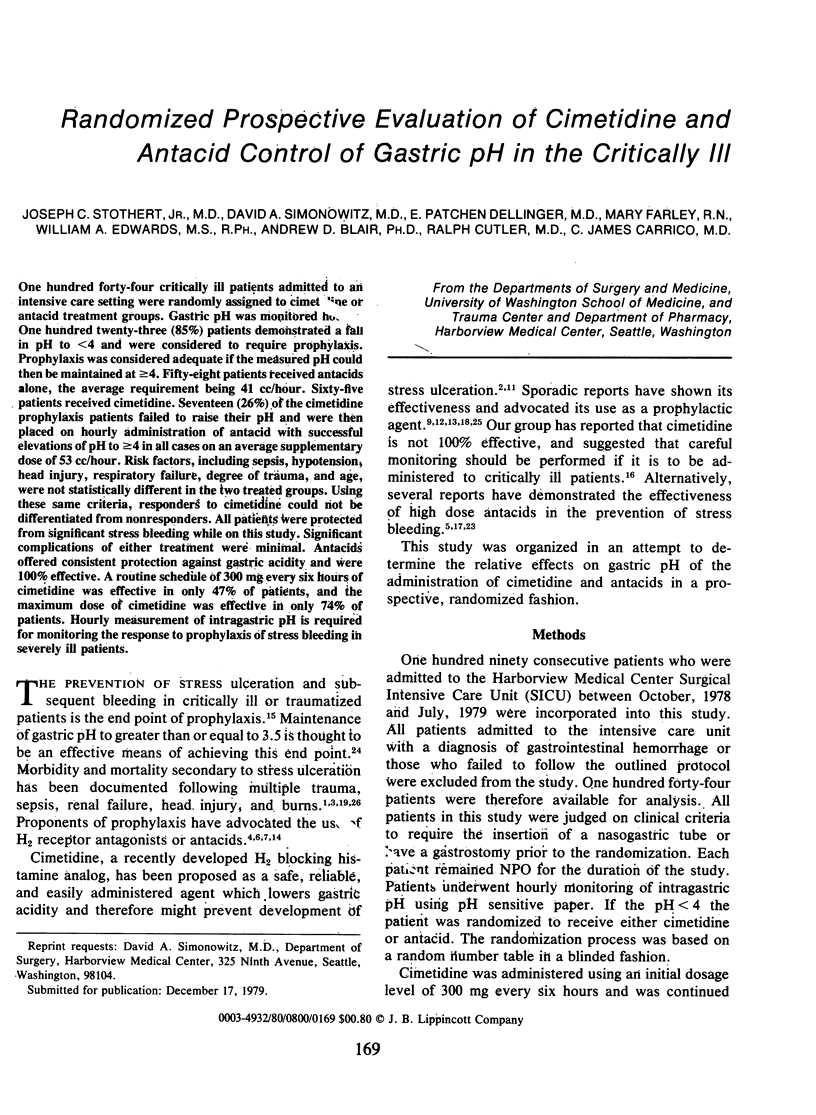
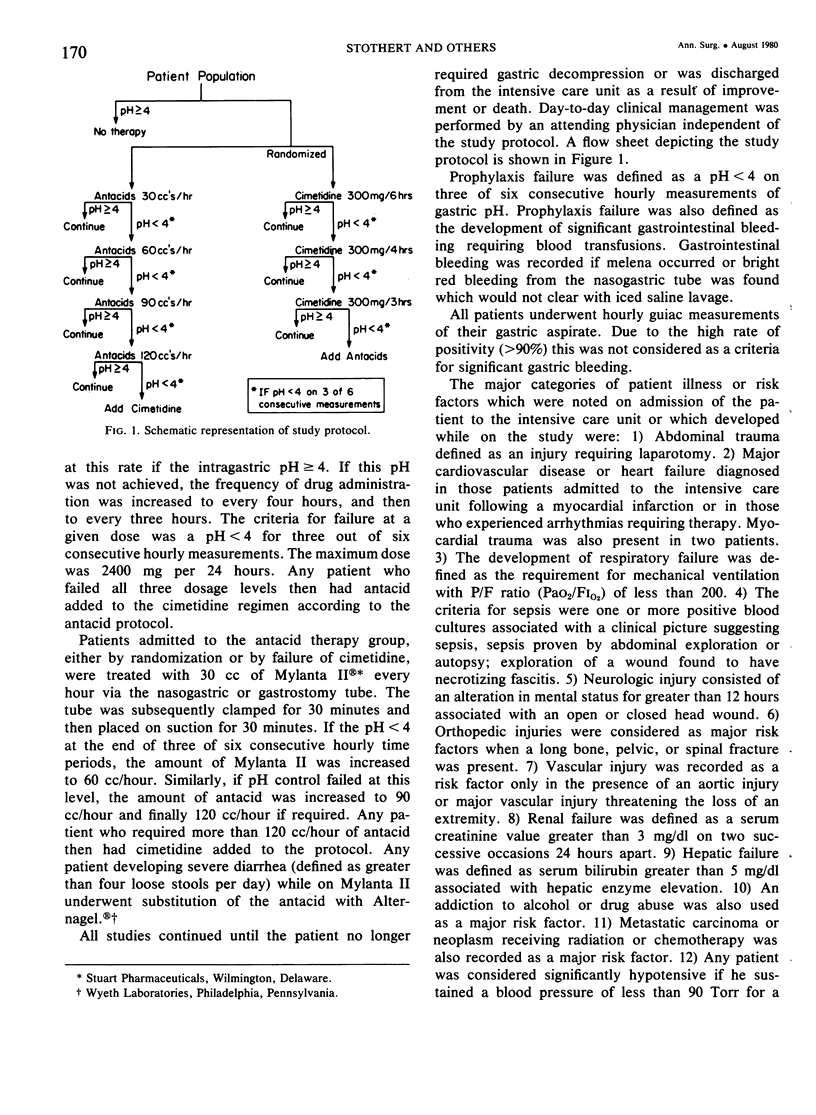
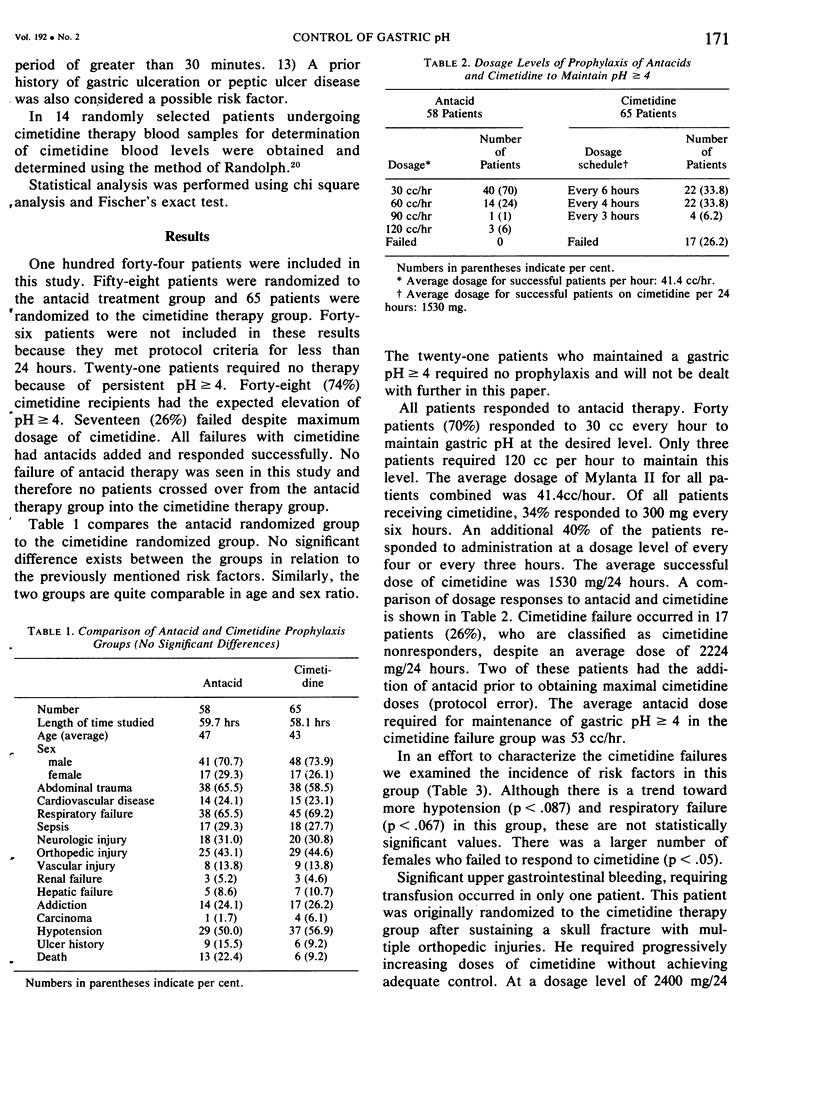
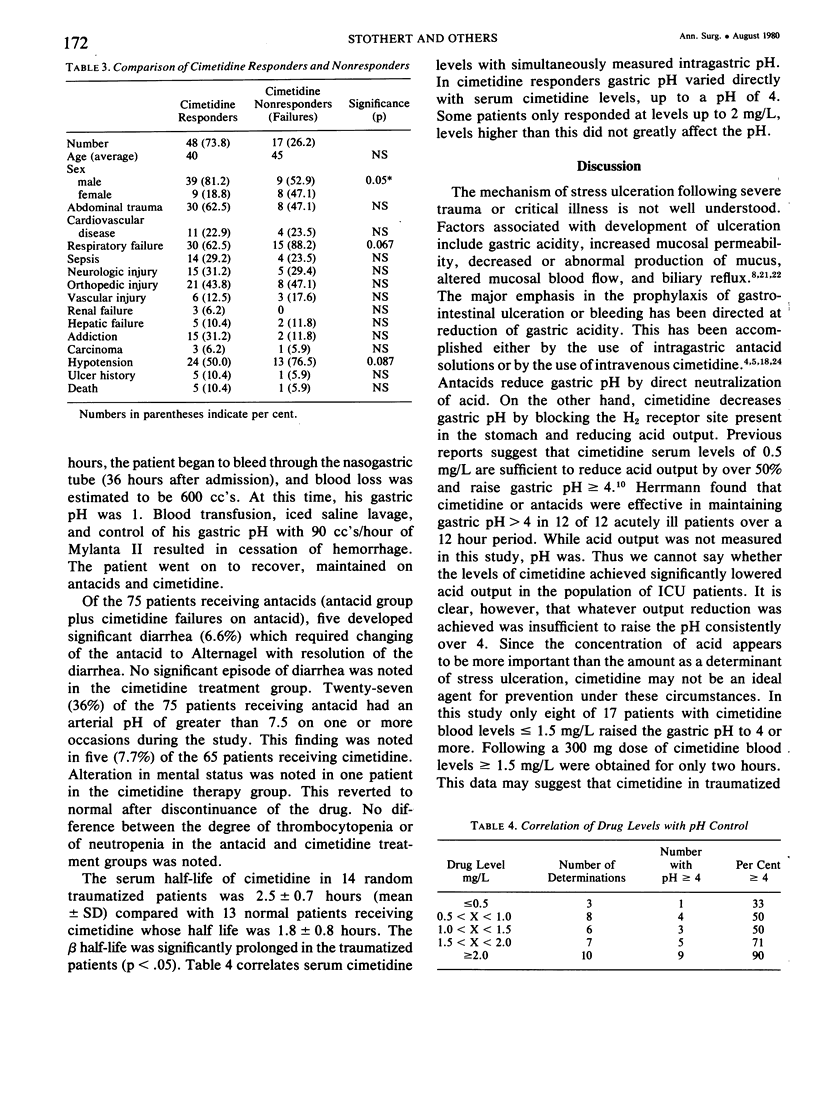
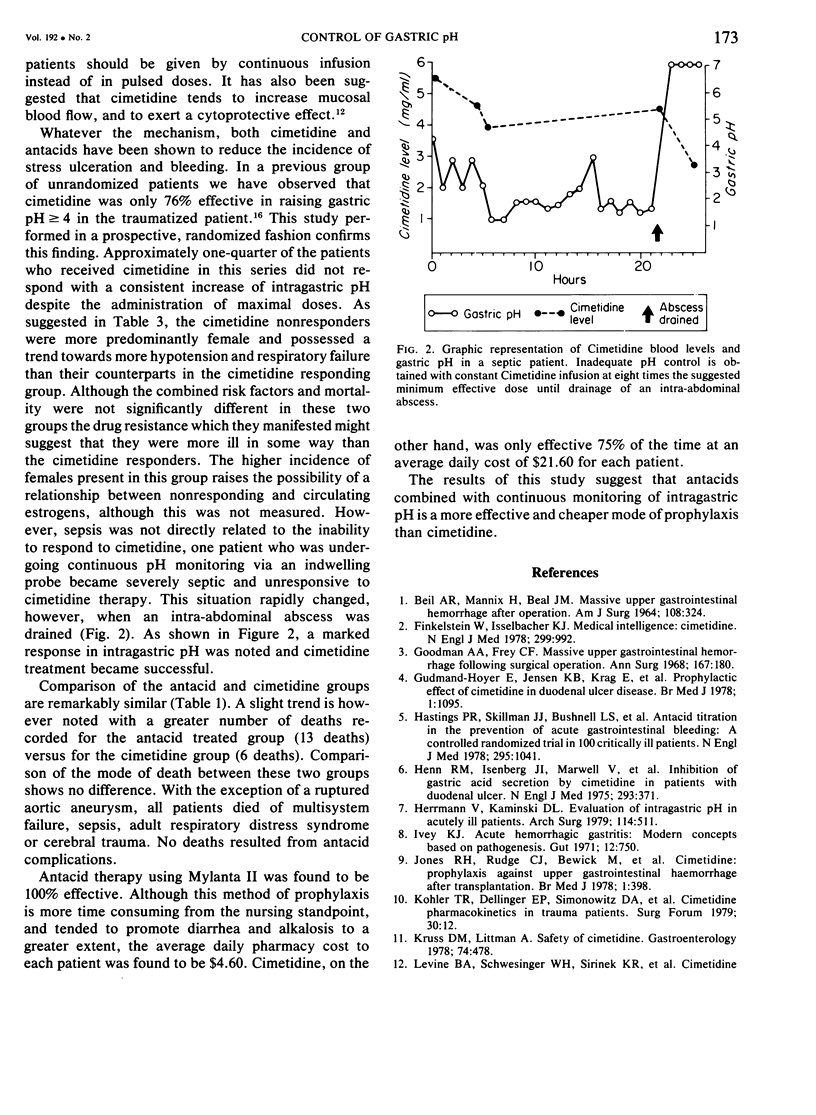
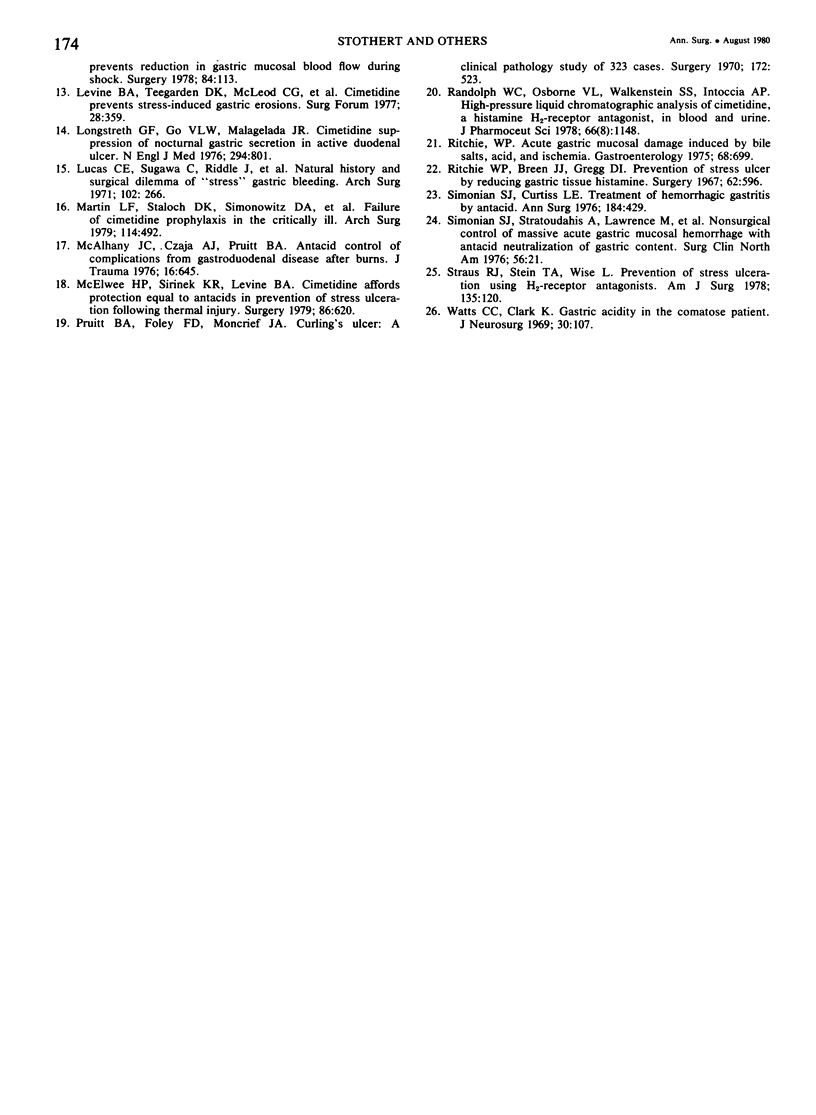
Selected References
These references are in PubMed. This may not be the complete list of references from this article.
- BEIL A. R., Jr, MANNIX H., Jr, BEAL J. M. MASSIVE UPPER GASTROINTESTINAL HEMORRHAGE AFTER OPERATION. Am J Surg. 1964 Sep;108:324–330. doi: 10.1016/0002-9610(64)90346-0. [DOI] [PubMed] [Google Scholar]
- Finkelstein W., Isselbacher K. J. Drug therapy: Cimetidine. N Engl J Med. 1978 Nov 2;299(18):992–996. doi: 10.1056/NEJM197811022991806. [DOI] [PubMed] [Google Scholar]
- Goodman A. A., Frey C. F. Massive upper gastrointestinal hemorrhage following surgical operations. Ann Surg. 1968 Feb;167(2):180–184. doi: 10.1097/00000658-196802000-00004. [DOI] [PMC free article] [PubMed] [Google Scholar]
- Gudmand-Høyer E., Jensen K. B., Krag E., Rask-Madsen J., Rahbek I., Rune S. J., Wulff H. R. Prophylactic effect of cimetidine in duodenal ulcer disease. Br Med J. 1978 Apr 29;1(6120):1095–1097. doi: 10.1136/bmj.1.6120.1095. [DOI] [PMC free article] [PubMed] [Google Scholar]
- Hastings P. R., Skillman J. J., Bushnell L. S., Silen W. Antacid titration in the prevention of acute gastrointestinal bleeding: a controlled, randomized trial in 100 critically ill patients. N Engl J Med. 1978 May 11;298(19):1041–1045. doi: 10.1056/NEJM197805112981901. [DOI] [PubMed] [Google Scholar]
- Henn R. M., Isenberg J. I., Maxwell V., Sturdevant R. A. Inhibition of gastric acid secretion by cimetidine in patients with duodenal ulcer. N Engl J Med. 1975 Aug 21;293(8):371–375. doi: 10.1056/NEJM197508212930802. [DOI] [PubMed] [Google Scholar]
- Herrmann V., Kaminski D. L. Evaluation of intragastric pH in acutely ill patients. Arch Surg. 1979 Apr;114(4):511–514. doi: 10.1001/archsurg.1979.01370280165027. [DOI] [PubMed] [Google Scholar]
- Ivey K. J. Acute haemorrhagic gastritis: modern concepts based on pathogenesis. Gut. 1971 Sep;12(9):750–754. doi: 10.1136/gut.12.9.750. [DOI] [PMC free article] [PubMed] [Google Scholar]
- Jones R. H., Rudge C. J., Bewick M., Parsons V., Weston M. J. Cimetidine: prophylaxis against upper gastrointestinal haemorrhage after renal transplantation. Br Med J. 1978 Feb 18;1(6110):398–400. doi: 10.1136/bmj.1.6110.398. [DOI] [PMC free article] [PubMed] [Google Scholar]
- Kohler T. R., Dellinger E. P., Simonowitz D. A., Blair A. D., Edwards W. A. Cimetidine pharmacokinetics in trauma patients. Surg Forum. 1979;30:12–14. [PubMed] [Google Scholar]
- Kruss D. M., Littman A. Safety of cimetidine. Gastroenterology. 1978 Feb;74(2 Pt 2):478–483. [PubMed] [Google Scholar]
- Levine B. A., Schwesinger W. H., Sirinek K. R., Jones D., Pruitt B. A., Jr Cimetidine prevents reduction in gastric mucosal blood flow during shock. Surgery. 1978 Jul;84(1):113–119. [PubMed] [Google Scholar]
- Levine B. A., Teegarden D. K., McLeod C. G., Jr, Sirinek K. R., Pruitt B. A., Jr Cimetidine prevents stress-induced gastric erosions. Surg Forum. 1977;28:359–361. [PubMed] [Google Scholar]
- Longstreth G. F., Go V. L., Malagelada J. R. Cimetidine suppression of nocturnal gastric secretion in active duodenal ulcer. N Engl J Med. 1976 Apr 8;294(15):801–804. doi: 10.1056/NEJM197604082941502. [DOI] [PubMed] [Google Scholar]
- Lucas C. E., Sugawa C., Riddle J., Rector F., Rosenberg B., Walt A. J. Natural history and surgical dilemma of "stress" gastric bleeding. Arch Surg. 1971 Apr;102(4):266–273. doi: 10.1001/archsurg.1971.01350040028006. [DOI] [PubMed] [Google Scholar]
- Martin L. F., Staloch D. K., Simonowitz D. A., Dellinger E. P., Max M. H. Failure of cimetidine prophylaxis in the critically ill. Arch Surg. 1979 Apr;114(4):492–496. doi: 10.1001/archsurg.1979.01370280146023. [DOI] [PubMed] [Google Scholar]
- McAlhany J. C., Jr, Colmic L., Czaja A. J., Pruitt B. A., Jr Antacid control of complications from acute gastroduodenal disease after burns. J Trauma. 1976 Aug;16(08):645–648. doi: 10.1097/00005373-197608000-00009. [DOI] [PubMed] [Google Scholar]
- McElwee H. P., Sirinek K. R., Levine B. A. Cimetidine affords protection equal to antacids in prevention of stress ulceration following thermal injury. Surgery. 1979 Oct;86(4):620–626. [PubMed] [Google Scholar]
- Pruitt B. A., Jr, Foley F. D., Moncrief J. A. Curling's ulcer: a clinical-pathology study of 323 cases. Ann Surg. 1970 Oct;172(4):523–539. doi: 10.1097/00000658-197010000-00001. [DOI] [PMC free article] [PubMed] [Google Scholar]
- Randolph W. C., Osborne V. L., Walkenstein S. S., Intoccia A. P. High-pressure liquid chromatographic analysis of cimetidine, a histamine H2-receptor antagonist, in blood and urine. J Pharm Sci. 1977 Aug;66(8):1148–1150. doi: 10.1002/jps.2600660825. [DOI] [PubMed] [Google Scholar]
- Ritchie W. P., Jr Acute gastric mucosal damage induced by bile salts, acid, and ischemia. Gastroenterology. 1975 Apr;68(4 Pt 1):699–707. [PubMed] [Google Scholar]
- Ritchie W. P., Jr, Breen J. J., Grigg D. I. Prevention of stress ulcer by reducing gastric tissue histamine. Surgery. 1967 Oct;62(4):596–600. [PubMed] [Google Scholar]
- Simonian S. J., Curtis L. E. Treatment of hemorrhagic gastritis by antacid. Ann Surg. 1976 Oct;184(4):429–434. doi: 10.1097/00000658-197610000-00005. [DOI] [PMC free article] [PubMed] [Google Scholar]
- Simonian S. J., Stratoudakis A., Lawerence M., Mungas J., Blackstone M. O. Nonsurgical control of massive acute gastric mucosal hemorrhage with antacid neutralization of gastric content. Surg Clin North Am. 1976 Feb;56(1):21–27. doi: 10.1016/s0039-6109(16)40832-7. [DOI] [PubMed] [Google Scholar]
- Strauss R. J., Stein T. A., Wise L. Prevention of stress ulcerations using H2 receptor antagonists. Am J Surg. 1978 Jan;135(1):120–126. doi: 10.1016/0002-9610(78)90021-1. [DOI] [PubMed] [Google Scholar]
- Watts C. C., Clark K. Gastric acidity in the comatose patient. J Neurosurg. 1969 Feb;30(2):107–109. doi: 10.3171/jns.1969.30.2.0107. [DOI] [PubMed] [Google Scholar]


